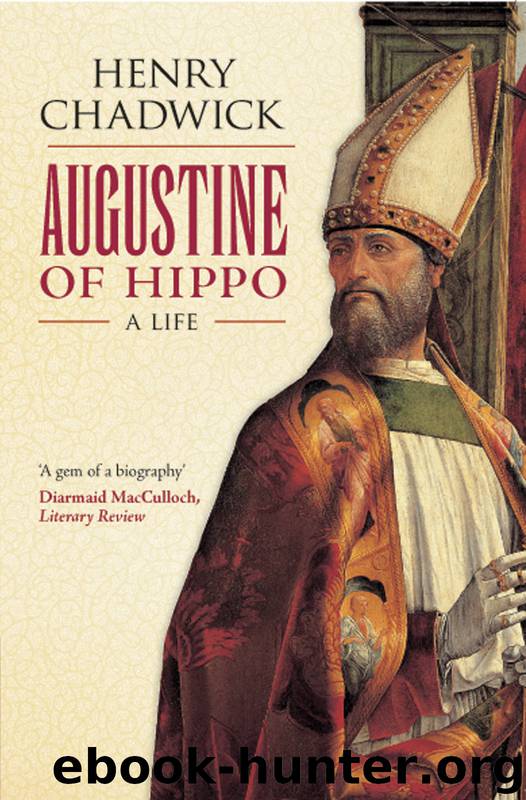Augustine of Hippo by Chadwick Henry;

Author:Chadwick, Henry;
Language: eng
Format: epub
Publisher: Oxford University Press USA - OSO
Published: 2010-03-18T16:00:00+00:00
The Confessions
In 397–8 the manuscript on Christian teaching was pushed aside unfinished in favour of a greater enterprise. His continued writings against the Manichees had set out to refute their interpretation of Genesis and of St Paul, and his mind battled away with the grand questions of Platonic metaphysics in relation to Christian faith. This mixture of themes was filling his mind when about the spring of 397 there arrived for him and for Alypius twin letters from the great aristocrat Paulinus, who in 395 had turned his back on a career of the highest secular eminence to settle in Italy at Nola (Campania) where he wished to build churches and hospices for pilgrims at the shrine of his favourite saint and benefactor St Felix. At Nola Paulinus founded a monastic community, news of which reached Thagaste. Monasteries founded by millionaires not being then an everyday occurrence, Alypius wrote him a letter of fraternal greeting. Paulinus had never met Augustine or Alypius, but was glad to return greetings from beyond the seas from brothers who, unlike many in Italy and elsewhere, had expressed no misgivings about his abandonment of secular responsibilities. Paulinus was not a little fascinated by the drama of his own career, since his renunciation had been a matter of some éclat throughout the West, and asked Alypius to send him details of his personal autobiography.
This request inspired Augustine into writing his supreme masterpiece, the Confessions. The book is very unlike anything else he wrote except the early Soliloquies. By a unique mixture he not merely expounds his Platonizing solution of evil as non-being or the absence of good with a rejection of Manichee exposition of Genesis and St Paul, but also sets out a doctrine of divine grace and human destiny. To this last theme his autobiography is presented as a subordinate illustration. The autobiography had the merit of answering critics anxious about his Manichee past; to his surprise a large number of people, not all friendly, seemed to be curious about his life-history. Since his months at Cassiciacum he had made private meditation his daily practice, and together with his brothers at Thagaste and Hippo had recited or chanted the Psalter. In the Confessions he adopts the extraordinary form of a prose-poem addressed to his Maker, not to human readers. The content of the work turns upon the double meaning of confessio as both praise and the admission of faults. In the manner of its presentation of ideas the work is the peak of which his preceding writings are like ascending foothills and soaring ridges. If the Confessions climb higher still, that is because the vehement love of Augustine’s passionate nature is now directed to God in adoration and mystical union.
The literary structure of the Confessions is loose and often unclear. Augustine himself is aware of his tendency to be discursive and, at one point, begs the Lord to help him to keep to the point. The encyclopaedia of his mind is full of questions, and he wanders into bypaths at the least provocation.
Download
This site does not store any files on its server. We only index and link to content provided by other sites. Please contact the content providers to delete copyright contents if any and email us, we'll remove relevant links or contents immediately.
| Anesthesiology | Colon & Rectal |
| General Surgery | Laparoscopic & Robotic |
| Neurosurgery | Ophthalmology |
| Oral & Maxillofacial | Orthopedics |
| Otolaryngology | Plastic |
| Thoracic & Vascular | Transplants |
| Trauma |
Periodization Training for Sports by Tudor Bompa(8273)
Why We Sleep: Unlocking the Power of Sleep and Dreams by Matthew Walker(6726)
Paper Towns by Green John(5191)
The Immortal Life of Henrietta Lacks by Rebecca Skloot(4589)
The Sports Rules Book by Human Kinetics(4388)
Dynamic Alignment Through Imagery by Eric Franklin(4217)
ACSM's Complete Guide to Fitness & Health by ACSM(4060)
Kaplan MCAT Organic Chemistry Review: Created for MCAT 2015 (Kaplan Test Prep) by Kaplan(4014)
Livewired by David Eagleman(3775)
Introduction to Kinesiology by Shirl J. Hoffman(3774)
The Death of the Heart by Elizabeth Bowen(3622)
The River of Consciousness by Oliver Sacks(3604)
Alchemy and Alchemists by C. J. S. Thompson(3522)
Bad Pharma by Ben Goldacre(3428)
Descartes' Error by Antonio Damasio(3279)
The Emperor of All Maladies: A Biography of Cancer by Siddhartha Mukherjee(3163)
The Gene: An Intimate History by Siddhartha Mukherjee(3098)
The Fate of Rome: Climate, Disease, and the End of an Empire (The Princeton History of the Ancient World) by Kyle Harper(3067)
Kaplan MCAT Behavioral Sciences Review: Created for MCAT 2015 (Kaplan Test Prep) by Kaplan(2987)
